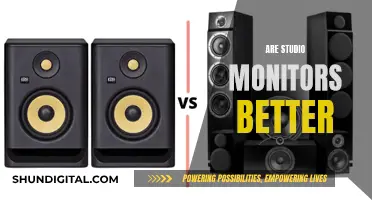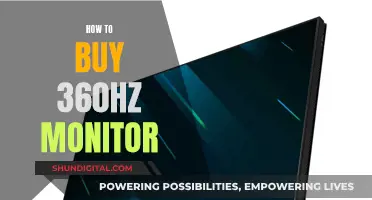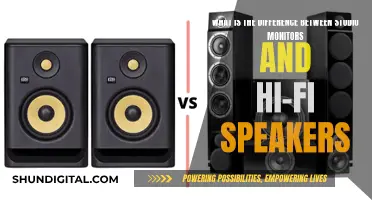
Many people wonder if speakers can damage their LCD monitors. The short answer is no, LCD monitors are immune to the effects of magnets. However, it is important to note that unshielded speakers can cause minimal problems for LCD monitors and other devices that are sensitive to magnetic interference. In addition, while it is unlikely, speakers may slowly affect your screen over time, causing discolouration.
| Characteristics | Values |
|---|---|
| Do speakers affect LCD monitors? | No, LCD monitors are immune to magnets. |
| Do speakers affect CRT monitors? | Yes, the magnet in a speaker is strong enough to interfere with the electron gun in a CRT monitor. |
| Do speakers affect laptops? | No, unless the laptop has a CRT screen. |
| Do speakers affect other devices? | Yes, speakers can affect devices that do not appreciate magnetic interference in large amounts. |
What You'll Learn

Speakers and CRT monitors
CRT stands for cathode ray tube, a type of display used in older televisions and monitors. CRT monitors use an electron gun to shoot electrons at the screen, which then light up to form an image.
Speakers use magnets to generate sound. If a speaker is placed too close to a CRT monitor, the magnetic field it emits can interfere with the electron gun, causing distortion and discoloration of the image. In some cases, prolonged exposure to a strong magnetic field can even damage the monitor.
To avoid this issue, it is recommended to keep speakers away from CRT monitors and to use shielded speakers, which are designed to minimize magnetic interference.
It is worth noting that LCD monitors, which are more commonly used today, are not affected by magnetic fields in the same way as CRT monitors. LCDs use a different technology that is not susceptible to magnetic interference, so speakers can be placed near them without causing any issues.
In conclusion, while speakers can affect CRT monitors, this is not an issue with LCD monitors. It is important to be mindful of the placement of speakers and other magnetic devices when using a CRT monitor to avoid distortion and potential damage.
Monitoring Bandwidth Usage: A Guide for D-Link Routers
You may want to see also

Shielded speakers
LCD monitors, on the other hand, are immune to magnetic interference. Therefore, shielded speakers are not necessary when used with LCD displays.
However, shielded speakers can still be beneficial in certain situations. For example, if you have other magnetic-sensitive devices nearby, such as hard drives or DVRs, shielded speakers can help prevent potential issues. Additionally, if you plan on using the speakers with a computer, shielded speakers can provide an extra layer of protection for your hardware.
It's worth noting that modern speakers are often shielded, and this feature is typically standard in many designs. Shielded speakers are also commonly found in studio monitors, as they are designed for accuracy in recording, mixing, and mastering.
Overall, while shielded speakers may not be necessary for LCD monitors, they can still offer peace of mind and ensure the optimal performance of your electronic devices.
GMAT Test Center Monitors: California's Standardized Screens
You may want to see also

Unshielded speakers
LCD monitors, on the other hand, use transistors to determine which colour gets activated in a pixel. There are no electrons being fired at a screen, so the external magnetic field of an unshielded speaker won't affect the colours displayed.
However, while LCD monitors are not affected by the magnetic field in the same way, there may be other effects caused by the external magnetic field. It is advised to keep unshielded speakers away from your computer hard drives, particularly those that are magnetic (non-SSD). While there is no evidence that unshielded speakers will damage hard drives, it is also unclear whether they are completely safe.
Many modern speakers are shielded, so it is worth checking if your equipment is shielded or not. If so, it is a non-issue, and you can place your speakers near your LCD monitor without any concerns.
Monitoring iPad Battery Usage: Tips and Tricks
You may want to see also

LCD monitors with built-in speakers
Unlike CRT monitors, LCD monitors are not affected by the magnetic fields generated by speakers. In CRT monitors, the speaker's magnet would distort the image and prolonged exposure could lead to damage. However, LCD monitors operate differently, and their images are not influenced by magnetic fields. Therefore, speakers will not damage LCD monitors, even when placed in close proximity.
Benefits of LCD Monitors with Built-In Speakers
- Space-saving: The integrated design eliminates the need for separate speakers, reducing the amount of desk space required.
- Streamlined setup: With built-in speakers, there is no need for additional audio connections or cables, simplifying the overall setup.
- Convenience: Users can enjoy audio and visual content through a single device, making it convenient for everyday use or for gaming and entertainment.
- Cost-effectiveness: There is no need to purchase separate speakers, making LCD monitors with built-in speakers a more economical option.
Examples of LCD Monitors with Built-In Speakers
Several brands offer LCD monitors with built-in speakers, providing a range of features and specifications to meet different user needs:
- HP offers a wide range of LCD monitors with built-in speakers, including the HP 24mh and HP OMEN series, which are popular for gaming.
- Lenovo's gaming monitor features a 24-inch borderless FHD display with built-in speakers.
- Viewsonic's 24-inch HDMI and DVI gaming monitor provides built-in speakers for an immersive audio-visual experience.
- Dell's P24H G5 23.8-inch LCD monitor offers built-in speakers for convenient audio playback.
Monitoring App Usage: iPad Settings for Parents and Guardians
You may want to see also

Magnetic interference
LCD screens are not affected by magnetic fields in the same way that CRT screens are. CRT screens use magnetic fields to operate, so placing speakers close to a CRT screen can cause picture distortion and discolouration. However, this is not the case with LCD screens.
That being said, it is worth noting that speakers do contain permanent magnets and generate electromagnetic fields. While this is unlikely to cause issues for LCD screens, it can cause problems for other devices, such as computer hard drives, magnetic disks, and magnetic tape.
If you are concerned about potential magnetic interference, you can take steps to shield your speakers. This involves covering the speakers with a material that is attracted to magnets, such as steel, at a thickness that captures all fields. While this can be effective, it is important to note that completely wrapping a speaker in metal will prevent sound from escaping.
Monitoring WiFi Usage: Track, Analyze, and Optimize Your Network
You may want to see also
Frequently asked questions
Speakers will not damage your LCD monitor. LCD monitors are immune to magnets, unlike older CRT monitors.
Speakers produce sound by using a magnet, which creates a magnetic field. This magnetic field can distort the image on a CRT monitor and prolonged exposure can cause damage. However, LCD monitors work differently and are not affected by magnetic fields.
Unshielded speakers pose a minimal problem to an LCD monitor. Modern speakers are typically shielded, so it is not an issue.
Yes, you can put speakers next to your LCD monitor without causing any damage. However, it is recommended to keep an eye on the screen when the speakers are nearby to ensure there are no changes or discoloration.







